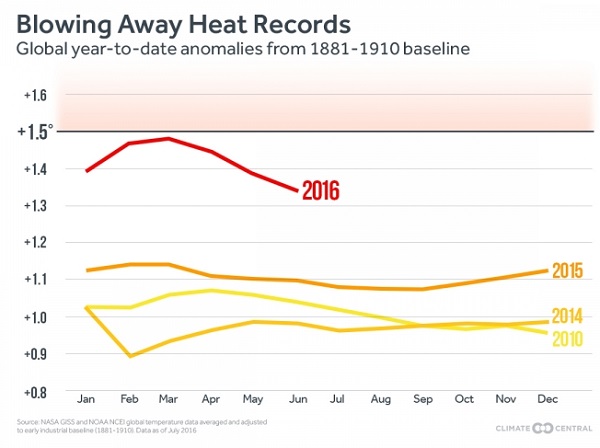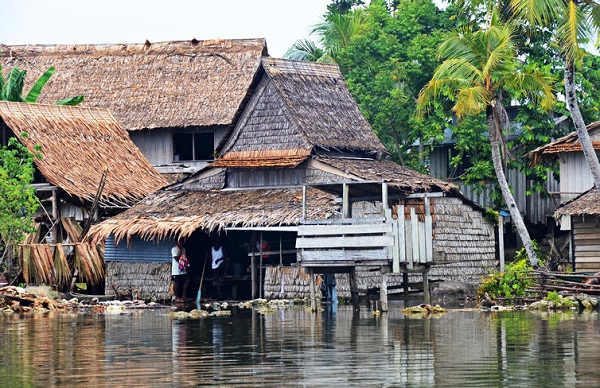1. Another record temperature month
We’ve now had 14 consecutive record global temperature months:

It’s tapering, but when will it end?
2. Opinion in the US is changing
The record heat in the US and what the Pope said is shifting opinion in the US towards concern about climate change.
Presidential candidate Donald Trump thinks climate change is a “hoax,” a “con job,” and “nonexistent.”
Let the world burn, he says:
- In a speech laying out his energy agenda for the United States, Trump promised to undo essentially every major policy developed in last decade intended to slow human-caused global warming.
Seems, however, in the swing states the opinion is otherwise. Indeed:
- A Yale University study from January 2015 found that 44 percent of registered Republican voters think that climate change is real and caused by humans. In fact, only self-identifying conservative and tea party Republicans are more likely than not to reject the scientific literature on climate change. Among liberal Republicans, 68 percent accept the science, and among moderate Republicans, 62 percent.
For some reason, democracy doesn’t always deliver the politicians the people deserve.
3. Brexit could benefit the environment
There are several ways in which Brexit could benefit the environment (paywalled – New Scientist). Firstly, The UK wouldn’t be able to water down EU laws anymore. The EU works on the consensus of all members. In recent years the UK has blocked or watered down many EU environmental regulations. Regulations that it did agree to may now be ripped up.
Alternatively the UK may be forced to comply with laws it can no longer influence, as is the case with Norway.
Second:
- Nearly half the EU’s budget is spent on the Common Agricultural Policy (CAP), which sees £3.5 billion go to landowners in the UK every year. To qualify for this subsidy, land doesn’t actually have to be farmed – it just has to be kept bare, as if ready for planting or grazing.
Those subsidies may well stop, which could lead to more intensive practices, or more land let go wild.
Third, the Emissions Trading System, which has failed, may be fixed. Opinion is that it has a better chance without Britain.
4. George Monbiot: These Brexiters will grind our environment into the dust
George Monbiot finds that in the event, all is not well. He points out that Britain is now free of the EU’s biodiesel policies, which he says is:
- a major cause of perhaps the greatest environmental disaster of the 21st century so far: the mass obliteration of the rainforests of Indonesia and Malaysia, driven in large part by palm oil production.
What Britain does now depends on the quality of people in critical positions. He has lined up environment secretary, Andrea Leadsom:
- Leadsom’s leadership campaign was characterised by incompetence, grandstanding and vacuity. Her record in government is dismal. One of her officials told the Financial Times she was “the worst minister we’ve ever had”. What does this say about the prime minister’s priorities? The living planet – the biggest and most important portfolio of all – is treated by May as the government’s Craggy Island.
Then:
- So here is the fix we’re in. We have an environment secretary whose ideology urges her to see the environment as an impediment to profit, a communities secretary whose every fibre rebels against the planning system, and an international trade secretary who used his previous post in government to connect with US corporate lobby groups. We no longer have a climate change secretary, of any description. We have a government that treats the Earth’s systems, upon which our survival depends, as an afterthought, or not a thought at all.
Carbon Brief looked at Theresa May’s record on climate change. Mostly she’s been silent.
5. Five islands lost to sea level rise
- Recently at least five reef islands in the remote Solomon Islands have been lost completely to sea-level rise and coastal erosion, and a further six islands have been severely eroded.
These islands lost to the sea range in size from one to five hectares. They supported dense tropical vegetation that was at least 300 years old. Nuatambu Island, home to 25 families, has lost more than half of its habitable area, with 11 houses washed into the sea since 2011.
In the past two decades sea level rise in the area has been almost three times the global average.
Many islanders live close to the sea:


